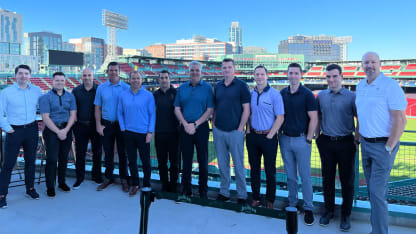Sullivan Hosts Coaches' Meetings in Native Boston

"I think it's an opportunity for our organizational coaching staffs to get together and get to know one another, talk hockey - talk about Penguins hockey in particular - and how we're trying to play," Sullivan said. "So, I think it's been invaluable to get us all on the same page on everything from the main concepts that we're trying to teach, to our philosophy of play, to the vocabulary that we use."
Part of the experience usually includes traveling somewhere, like Nemacolin, but they've been limited the past couple years due to the pandemic. But when Fenway Sports Group entered into an agreement to acquire controlling interest in the Penguins, inspiration struck for Sullivan.
"I was thinking, geez, maybe it'd be a great idea if we could do it this year in Boston," Sullivan said. "Especially since the only time they ever come to Boston, for the most part, is when it's freezing cold."
It ended up working out that the Massachusetts native, who lives in Duxbury, less than an hour outside of the city - was able to host everyone last week. This year's group consisted of associate coach Todd Reirden, assistant coach Mike Vellucci, skills coach Ty Hennes, goalie coach Andy Chiodo, hockey operations analyst/pro personnel Andy Saucier, and video coaches Madison Nikkel and CJ D'Alimonte from Pittsburgh; head coach J.D. Forrest, assistant coaches Kevin Porter and Sheldon Brookbank, and video coach Nick Biamonte from WBS; and head coach Derek Army and assistant coach Ryan Kuwabara from Wheeling.
The crew ate like true New Englanders under Sullivan's guidance, a self-proclaimed tough critic when it comes to seafood. He grew up in a coastal town that has three oyster companies, and his family enjoys clamming during the summers. So the first night, Sullivan took the group to Union Oyster House, which is Boston's oldest restaurant and a national historic landmark. "In my mind, it personifies Boston," he said.
Another evening, they rented a boat that took them on a cruise around Boston Harbor - where Sullivan joked that "a cigar or 10" was smoked - before getting dropped off at the dock of a waterfront restaurant called ReelHouse. "The harbor itself is beautiful. The views of the skyline is tremendous. So we tried to experience that," Sullivan said.
They also had a day of meetings at Fenway Park that featured some guest speakers, with Red Sox Chief Baseball Officer Chaim Bloom and Executive Vice President of FSG Corporate Strategy & General Counsel Ed Weiss talking to the group. After that day's work was done, the group remained at the historic venue to watch the Red Sox play.
"Those guys got a chance to see Boston from a different perspective," Sullivan said. "Then there's value in that team building, that camaraderie, that you gain through those types of experiences. You get to know people better, you're in a different environment, people let their guards down. I think everybody's relationships develop."
That's what has happened with Sullivan and WBS head coach J.D. Forrest, who have gotten to know each other really well over the years. Meanwhile, former players like Kevin Porter, WBS assistant coach, and Matt Cullen, now in player development, get to see a different side of the coaches than what they're used to.
While everyone had a great time getting to know each other, along with the city of Boston, they also worked hard, following detailed agendas. "We go through a lot," Sullivan said. "We not only look at our team, we look at the league, and we divide and conquer."
The Pittsburgh coaches are responsible for putting together presentations about different aspects of the Penguins game, along with the NHL's current best practices. They share ideas and insights so that they can find answers to questions like the following:
"What are the evolutions? Are there any new ideas and concepts out there that we can learn from that maybe we would adopt? Do we change the way we play? Do we tweak the way we play? Do we like the way we play?" Sullivan said. "We pick our own game apart. So there's a lot that goes into it."
Those conversations can get heated, as each individual brings their own unique convictions. But ultimately, they all challenge each other to be better coaches. And when the staffs come out of these meetings, they not only have a clear understanding of how the Penguins are going to play in every zone, on both sides of the puck, but exactly how they are going to teach it.
The players often talk about the importance of having trust and belief in each other, and that applies to the coaches as well, as Sullivan has so much respect for everyone that he's worked with during his Penguins tenure.
"They're such great coaches," Sullivan said. "They're such great hockey minds. They're passionate about the sport. They're passionate about the Pittsburgh Penguins. It's just been a privilege to coach with these guys, and I just can't say enough about the coaching staffs that I've had in my time here. These guys are great people."


















































